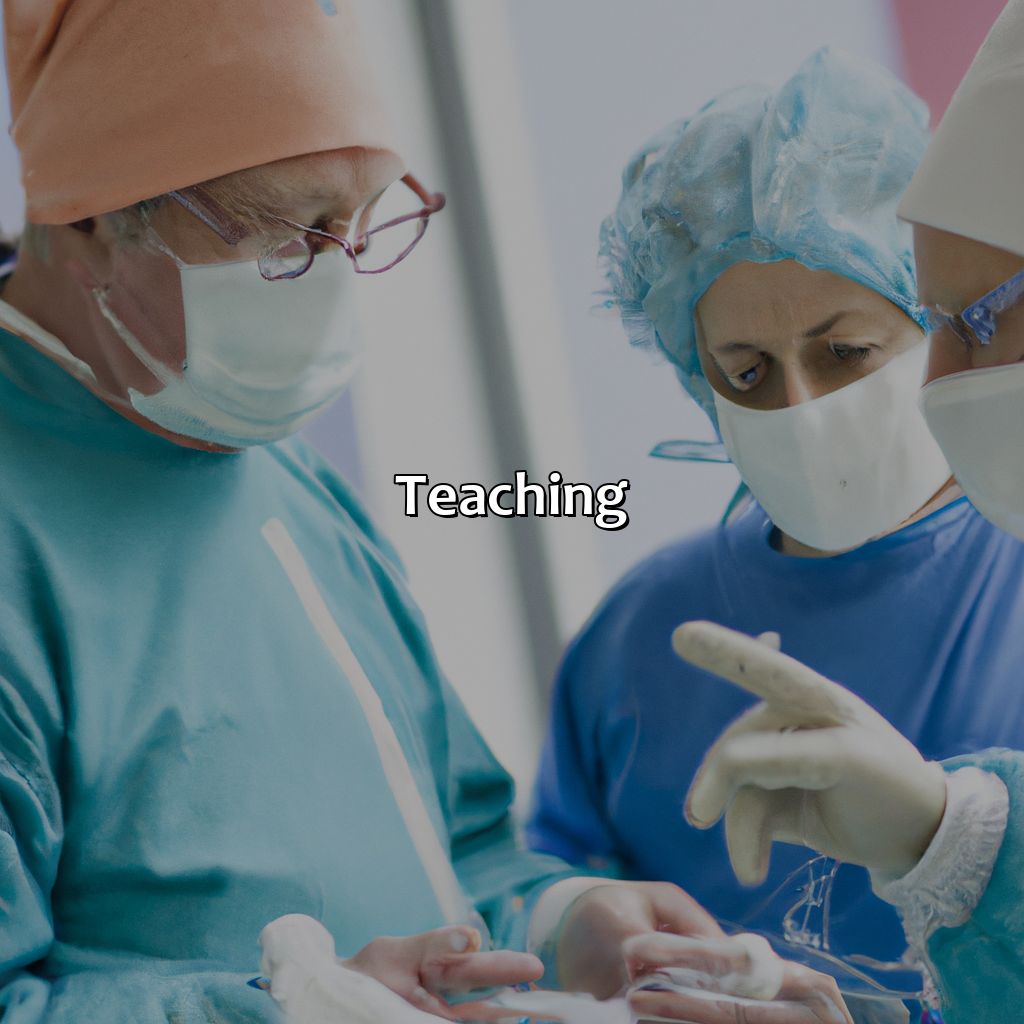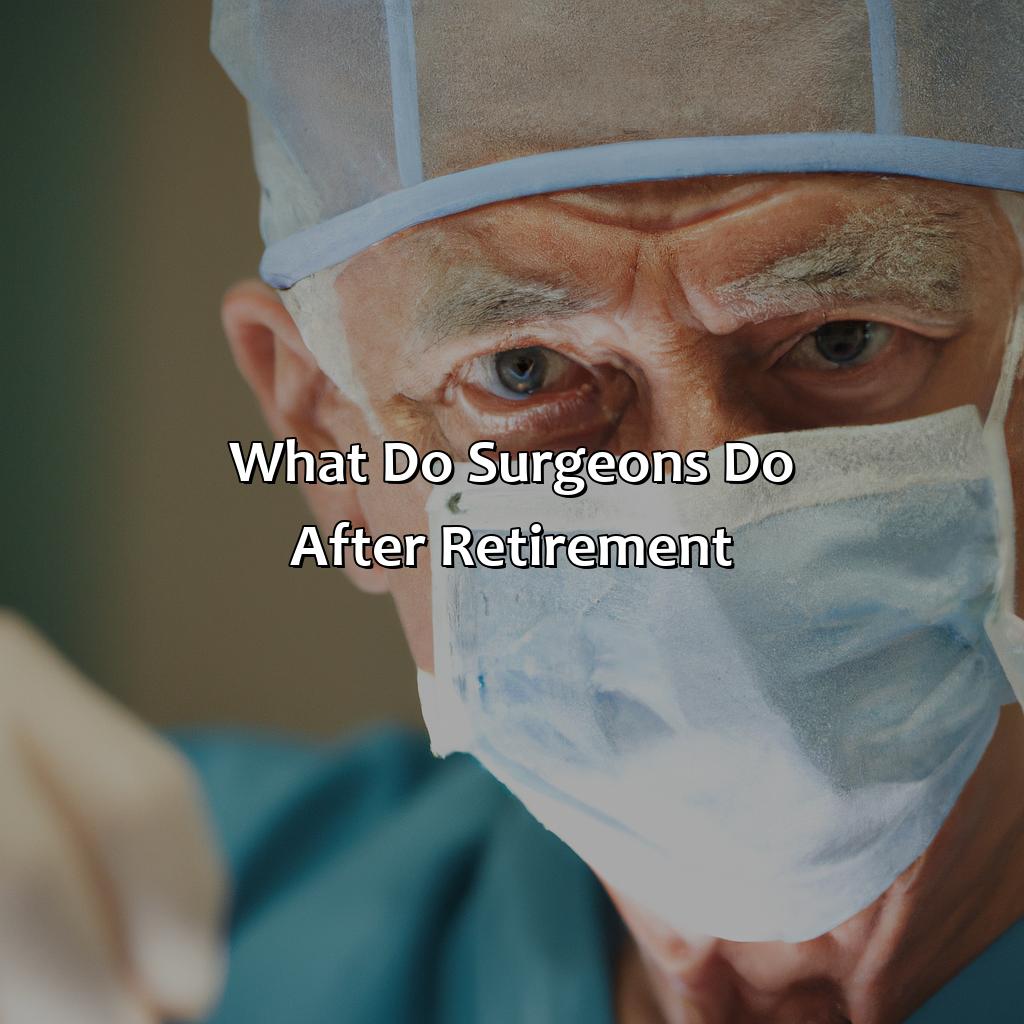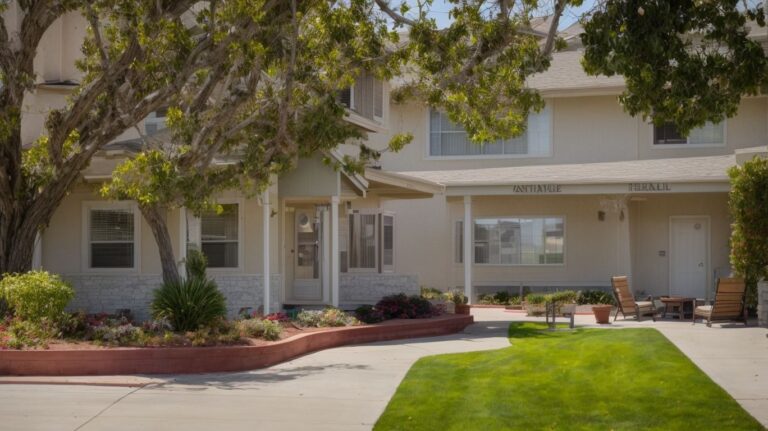What Do Surgeons Do After Retirement?
Key Takeaway:
- After retiring from surgery, many surgeons choose to volunteer their skills and knowledge to help underserved communities and those in need. This kind of work offers a great opportunity for retired surgeons to stay active and involved in their profession while giving back to the community.
- Teaching is another popular option for retired surgeons, as it allows them to pass on their knowledge and experience to the next generation of doctors. This can be done at medical schools, residency programs, and other educational institutions.
- Many retired surgeons also choose to focus on research and writing, using their experience and expertise to contribute to the medical field. This can involve publishing papers, conducting studies, and collaborating with other researchers.
Are you wondering what life looks like after retirement for a surgeon? You will be surprised to know that many of them pursue new adventures or continue to shine in their field. This article will delve into the various paths chosen by retired surgeons.
Volunteering
Volunteering for Social Causes
Surgeons, after retirement, often seek out opportunities to give back to society by volunteering for various social causes. Many retired surgeons utilize their extensive medical knowledge to provide medical care to remote areas or to disaster-stricken regions. They also engage in health education programs to create awareness and curate medical camps for underprivileged communities. These selfless contributions help build goodwill and enhance the surgeon’s reputation.
Furthermore, retired surgeons can also provide mentorship and guidance to aspiring medical professionals. Many retired surgeons take up teaching roles at medical institutions, sharing their experiences and knowledge with the next generation of doctors. They also participate in research activities, further contributing to the medical field.
Besides the aforementioned activities, retired surgeons can volunteer for social causes such as environmental programs, human rights initiatives, and community development projects. Volunteering for such causes can offer a platform to use their acquired skills in project management and organizational leadership that can positively impact society.
Retired surgeons can also stay connected with their colleagues and medical field by becoming a part of a professional association or a network of retired medical personnel. Such groups may offer opportunities for continued education, sharing best practices, and networking. Engaging in such activities can be extremely beneficial in maintaining a sense of purpose and satisfaction after retirement.

Image credits: retiregenz.com by David Jones
Teaching
Surgeons often choose to pursue a career in Teaching after retirement. This field offers an opportunity to share knowledge and skills with aspiring medical professionals.
Teaching in Retirement:
- Surgeons take up teaching roles in medical schools to impart surgical knowledge and mentor students.
- They conduct workshops and seminars to keep physicians up-to-date with the latest techniques and equipment.
- They provide consultation services to medical professionals, hospitals, and clinics.
- They serve as educators in community health and wellness programs, educating community members on health issues and treatment options.
In their teaching roles, retired surgeons often offer unique insights into surgical procedures and treatments, providing a diverse and enriching learning experience for students and professionals alike. One notable retired surgeon turned educator is Dr. William K. Brehm, who served as a plastic surgeon for over 35 years before retiring. Dr. Brehm went on to become a professor of surgery at the University of Michigan Medical School, where he helped to develop an innovative training program for plastic surgeons. His dedication to teaching has inspired countless medical professionals, and his contributions to the field continue to be felt today.

Image credits: retiregenz.com by Harry Arnold
Research and writing
Exploring the World of Scholarship and Authoring
Scholarship and authorship are integral components of a surgeon’s retirement. After a fulfilling career in medicine, distinguished surgeons dive into researching and writing medical journals, books, and various healthcare publications. They leverage their expertise and experience to lay the foundation for future generations and share their stories with the world. Through writing, they continue to explore their passion for medicine while passing on valuable insights to the next generation of healthcare professionals.
Continuing with their passion for research and analysis, retired surgeons meticulously analyze data and develop insights into various medical conditions. In their works, they delve deep into the various complications and advancements within the field and share their in-depth analysis with their peers and the general public. In publications, they explore new frontiers, identify novel procedures, and suggest potential solutions to various medical anomalies.
Retired surgeons also have a wealth of valuable information and stories from their long and illustrious careers. One such notable story involves Dr. Richard Selzer, who authored several books after retiring from medicine. Dr. Selzer was a celebrated surgeon who gained recognition for his literary style of writing about medicine. In his books, he blended his personal experiences with insights into the human condition, providing readers with unique and profound perspectives.

Image credits: retiregenz.com by Harry Jones
Consulting
Surgeons have the option to pursue a career in Medical Consulting Post-Retirement. Consulting involves utilizing their medical expertise and experience to advise other professionals or organizations. They can work as consultants for hospitals, pharmaceutical companies, and insurance firms to offer expert opinions on medical policies and procedures. These consultations can impact patient care and improve the quality of medical services provided.
Unique details include that consultants can earn a higher income than full-time physicians. Some doctors also offer training and education to medical students as part of their consulting services. A true history is that retired physicians have been successful entrepreneurs or started non-profit organizations that provide medical assistance to underprivileged communities.

Image credits: retiregenz.com by Joel Jones
Travel and leisure activities
For retired surgeons, recreational excursions and entertainment options have become an integral part of their routine. They find solace in exploring new destinations, cuisines, and cultures. Traveling to exotic locations, embarking on a gastronomic journey, and indulging in cultural activities top their bucket list. Many retired surgeons also spend quality time on hobbies such as reading books, playing golf, or listening to music.
Apart from traveling and pursuing hobbies, some retired surgeons also engage in charitable activities. They may volunteer for community service or offer medical aid to underprivileged communities. Such activities give them a sense of fulfillment and purpose.
Retired surgeons have interesting histories, where they have accomplished critical milestones throughout their professional careers. One such inspiring story is of Dr. Denton Cooley, a renowned Cardiovascular Surgeon, who continued performing surgeries at the age of 80. His spirit of serving mankind is truly commendable.

Image credits: retiregenz.com by Adam Duncun
Entrepreneurship
As retired surgeons seek new opportunities, many turn towards unleashing their entrepreneurial spirit. They leverage their extensive medical knowledge to launch innovative startups that solve healthcare challenges. They may also invest in promising new ventures or provide mentorship to the next generation of doctors. With a wealth of experience, retired surgeons can make significant contributions to the healthcare industry beyond the operating room.
Retired surgeons who embark on the journey of entrepreneurship can bring unique insights to the table. They understand the nuances of the healthcare landscape, the shortcomings of pre-existing solutions, and the potential for innovation. These insights can fuel the development of new products and services that address unmet needs of patients and healthcare providers. Furthermore, retired surgeons’ credibility and reputation can establish trust among investors and customers, accelerating the growth of their ventures.
Retired surgeons who pursue entrepreneurship may face some challenges along the way. As novices in the business world, they must adapt to new roles, such as fundraising, marketing, and networking. They may also need to navigate regulatory hurdles, protect their intellectual property, and build a team with diverse skill sets. However, with determination and a growth mindset, retired surgeons can overcome these obstacles and seize the opportunities that entrepreneurship offers.
John, a retired surgeon, founded a telemedicine platform that connects rural patients with specialists in urban areas. He recognized the lack of access to specialty care in remote regions and decided to use technology to bridge the gap. With his medical background and business acumen, John secured funding, built a team of developers, and launched the platform that has helped thousands of patients receive timely and affordable care. John’s story illustrates how retired surgeons can use their skills and passion to make a meaningful impact on healthcare.

Image credits: retiregenz.com by David Duncun
Five Facts About What Surgeons Do After Retirement:
Some retired surgeons choose to continue their work by volunteering at hospitals and clinics. (Source: Medical Economics)
Many retired surgeons pursue hobbies and passions that they couldn’t prioritize while working. (Source: Advisory Board)
Some retired surgeons use their skills and experience to mentor medical students and young doctors. (Source: Annals of Surgery)
Retired surgeons may also choose to work as medical consultants or expert witnesses in legal cases. (Source: Medical Economics)
Retirement can be a time for reflection and personal growth, allowing retired surgeons to explore new interests and perspectives. (Source: RetiredBrains)
FAQs about What Do Surgeons Do After Retirement?
What do surgeons do after retirement?
After retirement, many surgeons choose to pursue other interests or hobbies. Some may continue to work in the medical field in a non-surgical capacity, such as teaching or consulting. Others choose to volunteer their skills and knowledge in underserved communities.
Can retired surgeons still perform surgeries?
It is not common for retired surgeons to continue performing surgeries, as their skills and abilities may not be up to date with advances in technology and techniques. Additionally, they may not have the necessary liability insurance or hospital privileges to perform procedures.
Do surgeons receive any benefits after retiring?
Surgeons who have worked for hospitals or medical practices may receive retirement benefits, such as a pension, 401(k) or other retirement savings plans. They may also be eligible for healthcare and other benefits offered by their former employer.
How do retired surgeons stay current with medical knowledge and advancements?
Retired surgeons may choose to attend conferences and continuing education courses to stay current with the latest medical knowledge and advancements. They may also read medical journals and publications or stay involved in professional medical organizations to stay informed on changes in the field.
What are some common retirement plans for surgeons?
Common retirement plans for surgeons include pension plans, 401(k) plans, individual retirement accounts (IRAs), and other retirement savings plans. Some surgeons may also invest in real estate or other forms of passive income to supplement their retirement income.
How can retired surgeons make a difference in their community?
Retired surgeons can make a difference in their community by volunteering their skills and knowledge to help underserved populations. They may also mentor young people interested in pursuing a career in medicine or participate in medical missions to provide care in developing countries.
 Checkout this IRS Loophole
Checkout this IRS Loophole 




